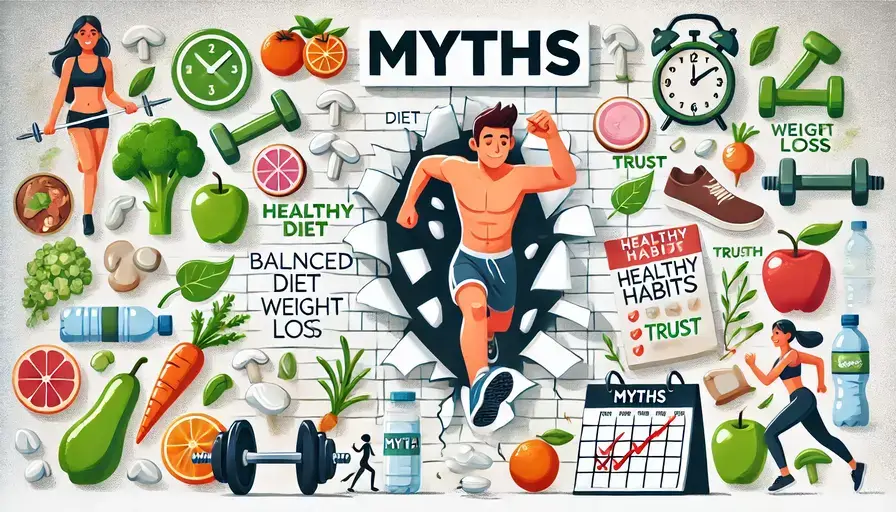What Are Some Common Myths About Weight Loss?
Discover the truth behind common myths about weight loss and learn evidence-based strategies for effective weight management.
Posted by
Related reading
Overcoming Weight Loss Plateaus: Understanding and Solutions
Learn what weight loss plateaus are, why they occur, and discover effective strategies to push past them and achieve your weight loss goals.
Navigating Food Challenges at Work: Tips for a Healthier Office
Explore effective strategies to overcome common food challenges in the workplace and maintain a healthy lifestyle throughout your workday.
Addressing Childhood Obesity: Practical Tips for Families
Explore effective strategies for combating childhood obesity and promoting healthy habits within families.
Finding Your Personal Motivation to Lose Weight
Discover how to identify your personal reasons for losing weight and stay motivated throughout your journey towards a healthier lifestyle.
Healthy Cooking at Home: 6 Strategies for Weight Loss
Discover the key benefits of home cooking and practical tips to make healthy meals that support weight loss goals without sacrificing flavor.

Table of Contents
- Myth 1: Weight Loss is About Willpower and Calorie Counting
- Myth 2: You Can Lose Weight by Exercising Alone
- Myth 3: Diuretics and Laxatives Help You Lose Weight
- Myth 4: All Calories are Equal
- Myth 5: Losing Weight is a Linear Process
- Myth 6: Supplements Can Help You Lose Weight
- Myth 7: Obesity is About Willpower, Not Biology
- Myth 8: Eat Less, Move More
- Myth 9: Carbs Make You Fat
- Myth 10: Fat Makes You Fat
- Myth 11: Eating Breakfast is Necessary to Lose Weight
- Myth 12: Fast Food is Always Fattening
- Myth 13: Weight Loss Diets Work
- Myth 14: People with Obesity are Unhealthy and Thin People are Healthy
- Myth 15: Diet Foods Can Help You Lose Weight
- Myth 16: You Must Count Calories
- Myth 17: Drink 8 Glasses of Water Daily
- Myth 18: Eat Low-Fat Foods
- Myth 19: Caffeine is Bad for You
- Myth 20: Eating Eggs Increases Cholesterol
- Myth 21: Smoothies and Fruit Juices are Good for You
- Myth 22: Margarine is Better than Butter
- Myth 23: Follow a Low-Carb Diet
- The Importance of a Balanced Approach
Introduction
There are many myths surrounding weight loss, weight gain, and diets. Despite decades of research, our society continues to struggle with rising obesity rates. This blog aims to debunk some of the most pervasive myths and misconceptions about weight loss and offer evidence-based insights into effective weight management.
Myth 1: Weight Loss is About Willpower and Calorie Counting
The Reality
Weight loss is not just about willpower and calorie counting. Metabolism, genetics, and individual biological factors play significant roles in how our bodies gain or lose weight. Two people who weigh the same may experience different rates of weight loss or gain, even if they consume the same number of calories. It's crucial to avoid prejudging someone's weight based on their lifestyle alone.
Further Insights
Factors like muscle mass, metabolic rate, and hormonal balance also impact weight loss. Studies have shown that individuals with higher muscle mass burn more calories at rest. Therefore, strength training can be as important as cardio exercises for weight loss. Additionally, stress levels and sleep quality significantly affect weight management. Chronic stress can lead to elevated cortisol levels, promoting fat storage, especially around the abdomen. Poor sleep disrupts hunger-regulating hormones, increasing cravings for high-calorie foods.
Myth 2: You Can Lose Weight by Exercising Alone
The Reality
Exercise alone is not enough to achieve significant weight loss. Diet plays a crucial role, and focusing on avoiding high fats, sugars, and carbohydrates while increasing protein intake can be more effective. Cardiovascular exercises that raise the heart rate, such as running, cycling, or high-intensity interval training (HIIT), are beneficial, but they need to be combined with dietary changes for optimal results.
Further Insights
Incorporating strength training into your routine can enhance muscle mass, which boosts metabolism. A combination of cardio and strength training offers the best results for weight loss and overall health. Additionally, it's important to recognize that over-exercising without proper nutrition can lead to injuries and burnout. Balance is key.
Myth 3: Diuretics and Laxatives Help You Lose Weight
The Reality
Diuretics and laxatives may cause temporary weight loss by increasing urinary frequency or bowel movements, but this is not a healthy or sustainable method. These substances can deplete essential nutrients and disrupt the body's microbiome, leading to long-term health issues. Using diuretics and laxatives for weight loss is considered an abuse and is not recommended.
Further Insights
Long-term use of these substances can lead to severe dehydration, electrolyte imbalances, and dependency issues. They do not reduce body fat, which is the true measure of weight loss. Instead, focus on a balanced diet rich in fiber, which naturally aids digestion and promotes regular bowel movements.
Myth 4: All Calories are Equal
The Reality
While all calories have the same energy content, their effects on weight and health can vary significantly depending on their source. For instance, calories from protein can boost metabolism, reduce appetite, and optimize weight-regulating hormones. In contrast, calories from refined foods can increase hunger and cravings, leading to weight gain.
Further Insights
The thermic effect of food (TEF) varies with different macronutrients. Protein has a higher TEF, meaning the body uses more energy to digest and metabolize it compared to fats and carbohydrates. Additionally, fiber-rich foods aid in satiety and regulate blood sugar levels, preventing spikes and crashes that lead to overeating.
Myth 5: Losing Weight is a Linear Process
The Reality
Weight loss is rarely a straightforward, linear process. It's common for weight to fluctuate due to factors like water retention, hormonal changes, and digestive contents. These fluctuations are normal and should not discourage you as long as the overall trend is downward.
Further Insights
Tracking progress through measurements, body composition analysis, and how clothes fit can be more motivating than relying solely on the scale. Remember, building muscle while losing fat can lead to little change in weight but significant changes in body composition and appearance.
Myth 6: Supplements Can Help You Lose Weight
The Reality
The weight loss supplement industry is vast, but most supplements have minimal impact on weight loss. The placebo effect often drives any perceived benefits, where individuals become more conscious of their diet because they believe the supplement is helping. Only a few supplements show modest effects, and it's always best to focus on diet and exercise for long-term results.
Further Insights
Consulting a healthcare provider before taking any supplement is crucial. Some supplements can interact with medications or have side effects. Natural weight loss strategies, such as balanced eating and regular physical activity, are more sustainable and effective.
Myth 7: Obesity is About Willpower, Not Biology
The Reality
Obesity is a complex condition influenced by numerous factors, including genetics, hormones, and medical conditions like hypothyroidism and PCOS. Biological pathways that regulate body weight can be dysfunctional in people with obesity, making weight loss more challenging and not solely a matter of willpower.
Further Insights
Research shows that certain genes can predispose individuals to obesity by affecting appetite regulation, metabolism, and fat storage. Hormonal imbalances, such as insulin resistance, can also hinder weight loss efforts. Comprehensive weight management plans should address these biological factors alongside lifestyle changes.
Myth 8: Eat Less, Move More
The Reality
While the principle of burning more calories than you consume is fundamental, simply telling someone to "eat less, move more" is ineffective. Sustainable weight loss requires a major and sustained change in lifestyle, including dietary habits, physical activity, and behavioral modifications.
Further Insights
Behavioral changes, such as mindful eating, stress management, and setting realistic goals, are essential for long-term success. Support from healthcare providers, nutritionists, and support groups can provide the necessary tools and motivation to sustain these changes.
Myth 9: Carbs Make You Fat
The Reality
Carbohydrates are not inherently fattening. Low-carb diets can aid in weight loss, but this does not mean all carbs are bad. Whole, unprocessed carbs are healthy and provide essential nutrients. The key is to avoid refined carbs and sugars, which can contribute to weight gain.
Further Insights
Complex carbohydrates, such as those found in whole grains, fruits, and vegetables, are digested more slowly, providing sustained energy and promoting satiety. In contrast, refined carbs can cause rapid spikes in blood sugar, leading to increased hunger and overeating.
Myth 10: Fat Makes You Fat
The Reality
Dietary fat is more calorie-dense than carbs or protein, but it doesn't automatically lead to weight gain. Healthy fats are essential for various bodily functions. The focus should be on limiting unhealthy fats and not avoiding fats altogether.
Further Insights
Healthy fats, such as those found in avocados, nuts, seeds, and olive oil, support heart health, brain function, and nutrient absorption. Trans fats and excessive saturated fats, often found in processed and fried foods, should be minimized due to their negative health impacts.
Myth 11: Eating Breakfast is Necessary to Lose Weight
The Reality
Eating breakfast is not a requirement for weight loss. Some studies show that breakfast skippers may weigh more, but this could be due to other healthy habits. The best approach is to eat when you're hungry and not force meals based on the time of day.
Further Insights
Intermittent fasting, which includes skipping breakfast, has gained popularity for its potential health benefits and weight loss effects. The key is to find a eating pattern that suits your lifestyle and supports your health goals.
Myth 12: Fast Food is Always Fattening
The Reality
Not all fast food is unhealthy. Many fast food chains now offer healthier options, and it's possible to find nutritious meals if you make mindful choices. However, traditional fast food items high in fats, sugars, and calories should still be consumed sparingly.
Further Insights
Look for options that include grilled proteins, salads, and whole grain sides. Avoid supersizing and sugary beverages. Making informed choices can allow you to enjoy fast food occasionally without derailing your weight loss efforts.
Myth 13: Weight Loss Diets Work
The Reality
Dieting often leads to short-term weight loss, but most dieters regain the weight within a year. Instead of hopping from diet to diet, focus on making permanent lifestyle changes that include healthier eating habits and regular physical activity.
Further Insights
Long-term success is achieved through sustainable habits rather than restrictive diets. Gradual changes, such as incorporating more vegetables, reducing portion sizes, and finding enjoyable forms of exercise, can lead to lasting weight management.
Myth 14: People with Obesity are Unhealthy and Thin People are Healthy
The Reality
Obesity is linked to several chronic diseases, but not all obese individuals are unhealthy, and not all thin people are healthy. Factors such as fat distribution and metabolic health are crucial. Some people with obesity are metabolically healthy, while some thin people have significant health issues.
Further Insights
Visceral fat, which surrounds internal organs, is more harmful than subcutaneous fat, which is found under the skin. Regular health check-ups and monitoring indicators like blood pressure, cholesterol levels, and blood sugar are important regardless of body size.
Myth 15: Diet Foods Can Help You Lose Weight
The Reality
Many products marketed as diet foods are processed and contain hidden sugars and unhealthy ingredients. It's essential to read labels and choose whole, unprocessed foods for true health benefits.
Further Insights
Focus on nutrient-dense foods like fruits, vegetables, lean proteins, and whole grains. Avoid products with long ingredient lists and unfamiliar additives. Preparing meals at home allows you to control ingredients and portion sizes.
Myth 16: You Must Count Calories
The Reality
Counting calories can be a helpful tool, but it's not the only way to lose weight. Understanding the nutritional value of foods and listening to your body's hunger and fullness cues are more sustainable strategies. Quality of calories matters more than quantity.
Further Insights
Mindful eating practices, such as eating slowly and savoring each bite, can help you recognize when you're full and prevent overeating. Focusing on balanced meals that include a variety of nutrients supports overall health and weight management.
Myth 17: Drink 8 Glasses of Water Daily
The Reality
Hydration needs vary based on individual factors like age, activity level, and environment. It's more important to listen to your body's thirst cues and adjust your water intake accordingly. Overhydration can be just as harmful as dehydration.
Further Insights
Foods with high water content, such as fruits and vegetables, contribute to your hydration needs. Monitoring urine color can be a simple way to gauge hydration levels—pale yellow indicates proper hydration.
Myth 18: Eat Low-Fat Foods
The Reality
Low-fat foods can be misleading, as they often contain added sugars to enhance flavor. Healthy fats are essential for bodily functions, and it's better to focus on the type of fat rather than eliminating it altogether. Choose sources of healthy fats like avocados, nuts, and olive oil.
Further Insights
The Mediterranean diet, which emphasizes healthy fats, has been shown to support weight loss and overall health. Incorporating moderate amounts of healthy fats can improve satiety and nutrient absorption.
Myth 19: Caffeine is Bad for You
The Reality
Moderate caffeine consumption can have health benefits, including a reduced risk of certain diseases. The key is moderation and avoiding high-calorie additives like sugary syrups and creamers. Black coffee and unsweetened tea can be healthy additions to your diet.
Further Insights
Caffeine can enhance physical performance and cognitive function. However, it's important to limit intake to avoid negative effects like anxiety, insomnia, and digestive issues. Drinking water alongside caffeinated beverages can help maintain hydration.
Myth 20: Eating Eggs Increases Cholesterol
The Reality
Dietary cholesterol found in eggs has little impact on blood cholesterol levels for most people. Eggs are a nutritious source of protein and healthy fats. Current guidelines suggest that eggs can be part of a healthy diet.
Further Insights
Eggs contain important nutrients like choline and vitamin D. For those with specific health conditions, such as hypercholesterolemia, it's best to consult with a healthcare provider for personalized advice.
Myth 21: Smoothies and Fruit Juices are Good for You
The Reality
While smoothies and fruit juices contain vitamins and minerals, they often lack the fiber found in whole fruits. Fiber is essential for satiety and regulating blood sugar levels. It's better to consume whole fruits and vegetables rather than relying on juices and smoothies as meal replacements.
Further Insights
If you enjoy smoothies, include ingredients like leafy greens, nuts, and seeds to boost fiber content. Be mindful of portion sizes and avoid adding excessive sweeteners. Whole fruits and vegetables provide more sustained energy and satiety.
Myth 22: Margarine is Better than Butter
The Reality
Margarine can contain unhealthy trans fats and added chemicals. While butter contains saturated fat, it is less processed. When choosing spreads, opt for natural options like butter or those made with healthy oils like olive or avocado.
Further Insights
Reading labels is crucial to avoid trans fats and other additives. Moderation is key when consuming any fat source. Using olive oil or avocado as spreads or in cooking can provide health benefits without the negative effects associated with trans fats.
Myth 23: Follow a Low-Carb Diet
The Reality
Low-carb diets can be effective for weight loss but are difficult to maintain long-term. Carbohydrates are the body's preferred energy source, and whole grains, fruits, and vegetables provide essential nutrients. Focus on quality carbs rather than eliminating them entirely.
Further Insights
Balance is essential in any diet. Combining adequate protein and healthy fats with high-quality carbohydrates can stabilize blood sugar levels and support sustained energy. Personalizing your diet based on individual needs and preferences can enhance adherence and success.
The Importance of a Balanced Approach
Weight loss and weight management require a balanced approach that includes a healthy diet, regular physical activity, and behavioral changes. Consulting with healthcare professionals, such as dietitians and doctors, can provide personalized guidance and support.
Further Insights
Adopting a holistic view of health, which includes mental and emotional well-being, is vital for long-term success. Mindfulness practices, stress management techniques, and fostering a positive relationship with food and exercise contribute to sustainable weight management.
Conclusion
The journey to weight loss and better health is complex and individual. By debunking these common myths and focusing on evidence-based practices, you can make informed decisions that support long-term success. Remember, sustainable weight loss is about making lasting lifestyle changes rather than relying on quick fixes or fad diets.
Other Interesting Articles

The Truth About Meal Replacement Shakes and Weight Loss
Discover the effectiveness, benefits, and potential pitfalls of meal replacement shakes in your weight loss journey.

Understanding Weight Loss Plateaus and How to Overcome Them
Learn about weight loss plateaus, the reasons they occur, and effective strategies to break through them for continued progress.

Meditation in a Minute: Quick Techniques for Busy Lives
Explore simple yet effective meditation techniques you can practice in just a few minutes, perfect for busy lifestyles.

The Ketogenic Diet: What You Need to Know About Safety and Efficacy
Explore the ketogenic diet, its health implications, and expert insights on its long-term effectiveness for different populations.